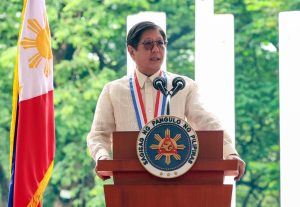Philippine President Ferdinand Marcos Jr. has ordered a lifestyle check of officials amid the public uproar over the reported extravagant living of families of politicians and business owners implicated in corruption-tainted government projects.
During his State of the Nation Address in July, Marcos blamed corruption for the intense flooding crisis that submerged communities across the country. He subsequently released a list of companies that bagged flood-control projects. In the past month, he visited and inspected at least 11 sites and exposed substandard projects. After enjoining the public to expose corruption in their barangays (villages), Marcos’ office has received more than 2,000 complaints in a matter of days, which reflected the widespread anger and extent of graft practices.
Taking a cue from the anti-corruption drive of the president, both chambers of Congress initiated separate investigations into the rollout of flood-control projects. In the Senate, a Cabinet secretary in charge of the government’s infrastructure program acknowledged that numerous flood-control projects have turned out to be nonexistent. It was also revealed that some legislators either received campaign contributions or have family ties with companies that got billion-peso contracts.
The backlash over the flaunting of the wealth of relatives of politicians and their contractors suspected of misappropriating public funds prompted Marcos to order an immediate lifestyle check in government agencies.
It remains to be seen how far Marcos will pursue the campaign to exact accountability from those who conspired to steal from the national treasury. After all, his own family has earned global notoriety for plundering the nation’s wealth during the Martial Law era, when his father Ferdinand E. Marcos ruled the country as a strongman.
Marcos is also risking losing support since some of his close allies are linked to companies that got fat contracts from the government. The family of his former ally, Vice President Sara Duterte, could cite the flood-control controversy to denounce the large-scale corruption under the incumbent presidency.
So why is Marcos actively leading this campaign, which could undermine his government and gravely affect the chances of his anointed candidates in the 2028 presidential election?
The most likely reason is to avoid being a lame duck leader by controlling the narrative of how the anti-corruption investigation will unfold. Marcos justified an expanded executive discretion in approving or rejecting congressional amendments in the 2026 budget bill by flagging the flood-control issue. He can also prevent members of the ruling coalition from switching to another political camp since he can easily expand the list of dubious companies with direct and indirect links to politicians. He can even raise the issue to revive scrutiny into the flood control projects of the previous Duterte administration.
The president’s seemingly bold action of being a corruption whistleblower is not a new tactic. It was the Malacañang presidential palace that released the audio recording of an alleged conversation between the president and an election officer in 2004; and it was the president’s office that unveiled the list of politicians involved in the pork barrel scam in 2013. In both cases, the government sought to preempt the opposition and manage public outrage since it was Malacañang that seized the initiative in defining the parameters of the debate and controversy.
By publishing the names of contractors with flood-control projects worth billions of pesos, Marcos could direct public gaze into this issue while playing down the potential anomalies in equally important budget concerns, such as the president’s use of confidential funds and the country’s ballooning debt.
In his public pronouncements, Marcos has repeatedly vowed to fight corruption until the end of his term. He could be seeking to improve his credibility and restore public trust, but so far, the public is still overwhelmed with the staggering corruption figures and the impunity that enabled the collusion of politicians and their cronies in institutionalizing the theft of people’s money.
Marcos assumes he will lead the anti-corruption struggle up to the end, but he could soon become the main target of a citizen movement for transparency and clean governance after the people realize that it was Malacañang that drafted and implemented the budget, and it was the president who signed the pork barrel-infested budget bill into law.
































